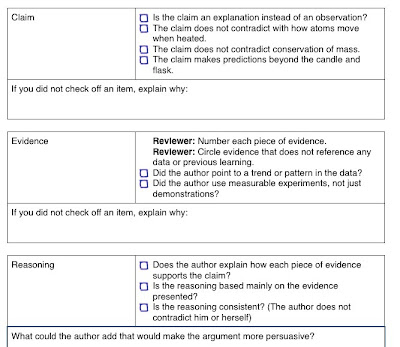continued from
part 1
Three suggestions:
1. I stole whiteboard round robins from
Argument-Driven Inquiry (there are some good resources
here. Try the first link under Papers for an overview). Instead of doing whole class discussion around group results, I have kids set up their whiteboards. One person stays behind while the rest of the group rotates from table to table to hear what each group found out. The roaming kids have a paper where they record some of the basic details from the other groups and it asks them to evaluate and respond to what they hear. Sorry. I wanted to post an example but I seriously can't find a single one. I don't know why. I know in the past I've asked them to comment on whether this confirms or contradicts their own findings, the quality of the experimental design, and suggestions for what might make their argument more convincing. We struggle with evaluating the quality of the argument. It's an ongoing thing.
After returning to their tables they are given the chance to revise their claim or reasoning and if I'm really on it that week, they can design a follow-up. The ADI folks suggest a presider to summarize the findings of the class. I've never tried that.
In hindsight, I think it would be kind of awesome to have students cite other groups in their write-ups just like in a scientific paper. "According to Lopez, Lee, and Silva........."or maybe just have them cite and end note. Or include a section in their CER papers for rebuttals where they specifically attempt to rebut a different group. Hmmm. Something for me to try next year.
2. ADI also has a nice double-blind peer review suggestion. I do standard peer review but haven't added the double-blind aspect. I think that could be interesting. There's a long template
here and on page 5
here (both links from
here). I think those are a bit unwieldy for MS or even HS kids. For their chemistry final I had my students attempt to explain the
candle and flask demo. For peer review we used this:
I tailored it based on what my students specifically have trouble with. It was helpful but not amazing. Next year I'd add something more specifically aimed at persuasiveness (see? We're good with inquiry and content knowledge. Bad with argument). Also, like any peer review, if everyone was weak at something we didn't add a lot of value by peer reviewing. We have a lot of trouble with logical consistency. For example, saying that the heat made the air spread but then later arguing that the water was cold so that's why it spread into the flask. I think having students flow chart their arguments might help but this is something I struggle with. Any suggestions would be great.
3.
Conditional language is critical. Once I, as the teacher and scientific authority, tell the students that matter
is conserved in a chemical reaction their brains shut down. It sounds dumb and too New Age-y for me and I don't have any hard evidence to back this up. All I know is the longer I stick with "might be" and "could" or even "probably" I can see my students still working hard to convince me that they're correct. (The downside is I had a frustrated student blow up at me this year because we "never settle anything" and so he's "not sure what's right and what's wrong." There's a balance I'm still working to find.)
--------------
Brian left a
comment pointing to another
paper arguing that we need to make a clear distinction between argument and explanation. I agree to the point where we need to understand that giving opportunities to explain is not the same as giving opportunities to argue. I'm less sure how important it is to teach to students the semantic difference. To clarify, I'm sure it's important, I'm just not sure what it's
more important than and what I would then cut out.
